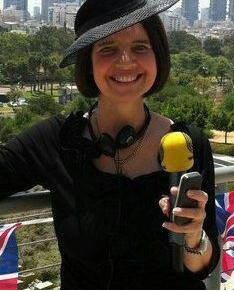- Home
- Rokdim-Nirkoda 118
- Illuminating the World of Dance
Illuminating the World of Dance
In Memory of Yair Vardi z"l (May 29, 1948 - May 25, 2025)
- Translation: Ruth Goodman
In 2010, the Suzanne Dellal Center was awarded the Israel Prize. Among the reasons for the award: “In its twenty years of activity in Neve Tzedek, the Center has succeeded in bringing about the rise of the art of dance in the State of Israel. The Center’s many and diverse artistic initiatives have nurtured a new generation of artists, creators and performers in the field of artistic dance.” When the award was presented to Yair Vardi, who was the life’s breath in the establishment of the Center and the director of the Center for thirty years, it was clear and obvious because when you said the Suzanne Dellal Center, you said Yair Vardi.
The Suzanne Dellal Center was built with funding from the British Dellal family in memory of their daughter Suzanne, who died at the age of 23 under tragic circumstances. It opened to the public in 1989, which is when I also met Vardi while working as a reporter for “Rokdim” magazine. Later, my acquaintance with Vardi deepened after I also became the dance correspondent for Kol Israel. In those early days of this impressive project, most of the public was not familiar with the Neve Tzedek neighborhood at all.
In a short time, the place became a magnet for anyone who was involved in or simply loved dance, with all its genes, themes, and dancers. The entire neighborhood developed around it.
Vardi was the man who was always there, not only for ideas such as the international exposure events to cultural centers around the world, “Haramat Masach – Raising the Curtain,” “Macholohet – Hot Dance”, and others, but he was physically available to everyone. He lived and breathed the place, infusing everyone around him with his enthusiasm and vision.
Yair Vardi was born on Kibbutz Kfar Blum, precisely at the same time as the birth of the State of Israel in May 1948. Let us recall that at that time, a kibbutz member who wanted to go out to dance was unusual, one might say, even daring. When he arrived in the big city, he quickly became a dancer in the Batsheva Company and later even choreographed for the company.
He made the biggest leap in his career in England, initially in London and later in the dance company he managed in the city of Newcastle. The idea of a unique dance center in Israel brought him back to Israel with his wife, the dancer Stella Ford. The Center also became the center of his life.
Over the years, he pushed and was excited by every development at the Center: the construction of the adjacent building for the Batsheva Company, the Yaron Yerushalmi Children’s Performance Festival, large-scale outdoor events, and so on; each time there was a new idea, each time new partnerships at home and abroad. When he retired from the Center, he was appointed director of dance at the Jerusalem Academy of Music and Dance and continued to be active in the world of dance.
But not much has been said about his original thinking and the fact that he did not discriminate. This is undoubtedly one of the things that is important to mention in the context of Vardi’s work, the fact that he did not rank the types of dance. Any dance, if it was done well, was worthy in his eyes. Thus, he later became an active and full partner in the artistic management of the dance festivals in Karmiel. Being a man without dichotomies, he legitimized and elevated folk dance and, for that matter, Middle Eastern dance (what is sometimes called belly dancing in our regions). The Center also provided a stage for flamenco dance with the “Flamenco Days” festivals, the initiative of the late Eva Agmon z”l, in memory of her flamenco dancer daughter Adi Agmon z”l.
Vardi loved dance with all his heart and soul, in all its forms, and this was his life’s mission. In one of the interviews I did with him for Reshet Bet of Kol Israel, I asked him what he thought about the shows that suddenly appeared on our television screens, such as “Nolad Lirkod – Born to Dance,” “Rokdim Im Kochavim – Dancing with the Stars,” and the like. I expected an answer that would mock these reality shows, but Vardi answered simply: “These programs only do good for the dance world. Look how many people who were not at all connected to dance discovered this world, and now we too have new audiences. Every dialogue with this world is blessed, and may there be more like it in the future. May we be blessed with a generation that did not know dance but discovered it with joy.”









Comments
התראות